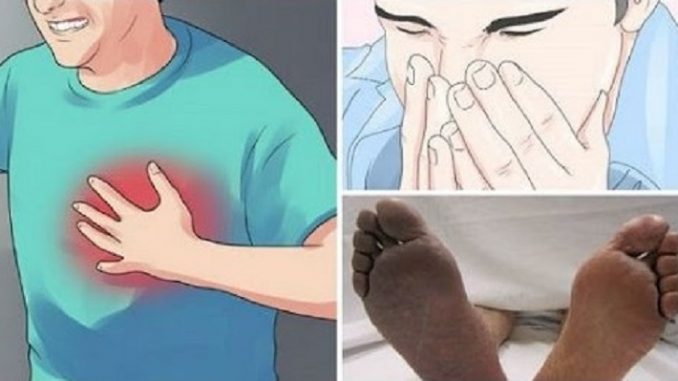
Are you sure that your lifestyle is healthy enough to stave off a heart attack?
Here is a list of risk factors for heart attacks: smoking, unhealthy diet and obesity, lack of exercise, alcohol use, high blood pressure and diabetes.
If you are an average American, or an average world citizen for that matter, you probably sport one or more of these risk factors.
Why so many of us insist on neglecting out health and risking our lives unnecessarily remains a mystery, but fortunately the internet is a treasure chest of useful information that can save our lives if we don’t care too much to live more sensibly.
Over at Bright Side they have listed eight signs your body will give you a month before you get a heart attack. This will help you to recognize a heart attack a month before it happens.
6. Chest pain
This is the most obvious sign of an impending heart attack. If you have a blocked artery or are having a heart attack, you may feel pain, tightness, or pressure in your chest.
Men and women experience chest pains in different intensities and forms. In men, this symptom refers to the most important early signs of an impending heart attack that should not be ignored. On the other hand, it affects only 30% of women.
Description: Chest pain can expand to uncomfortable sensations in one or both arms (more often the left one), the lower jaw, neck, shoulders, or stomach. It may have a permanent or temporary character. People use different words to describe the sensation from saying it’s like an elephant is sitting on them or it’s like a pinching or burning.
5. Excessive perspiration
Unusual or excessive sweating is an early warning sign of a heart attack. It might occur at any time of the day or night. According to WebMD, breaking out in a cold sweat for no obvious reason could also signal a heart attack.
It’s more common for women to experience excessive sweating and it’s often confused with the hot flushes associated with menopause.
Description: Flu-like symptoms, clammy skin, or experiencing sweatiness regardless of air temperature or physical exertion. Sweating seems to be more excessive at night.
4. Irregular heartbeat
It’s normal for your heart rate to increase when you’re nervous or excited, but if you feel like your heart is beating out of time for more than just a few seconds, or if it happens often, it might be a sign that you’re heading for a heart attack.
“Skipped beats or arrhythmias are often accompanied by a panic attack and anxiety, especially among women. It appears unexpectedly and reveals itself differently: arrhythmia (irregular heartbeat) or tachycardia (increased heart rate). Physical exercises might give an extra stimulus to the increase of heart rate, especially in cases with atherosclerosis disease,” reports Bright Side.
Description: The irregular heartbeat lasts for 1-2 minutes. If it doesn’t fade, you might feel dizziness and extreme fatigue. Call the doctor right away.
3. Hair loss
Losing your hair is considered to be just another visible indicator of the risk of heart disease. Most commonly it affects men over 50, but some women may also be in the risk group. Baldness is also associated with an increased level of the hormone cortisol.
Description: Pay close attention to losing hair from the crown of your head.
2. Shortness of breath
Breathlessness, or dyspnoea, is a common symptom of several medical conditions, heart problems being one of them. If the heart muscle is not pumping effectively, pressure can build up within the lungs and the chambers of the heart, creating the sensation of breathlessness.
It often occurs among men and women for up to 6 months prior to having a heart attack.
Description: Feeling like you can’t get enough air, dizziness, and shortness of breath.
1. Insomnia
Insomnia is also associated with an increased risk of a heart attack or stroke. A decrease in oxygen levels — caused by changes in the heart due to heart disease — may trigger subtle changes that lead to anxiety, insomnia, and agitation that can’t be explained by normal circumstances. People who’ve had a heart attack often realize afterwards they began to experience anxiety and sleep problems in the months before the attack. Could this be the body’s way of warning you that something’s not right?
Description: Symptoms include difficulty falling asleep, difficulty staying sleep, and waking up very early.
Source: One Month Before The Heart Attack, Your Body Will Warn You – Here Are The 6 Signs

Leave a Reply